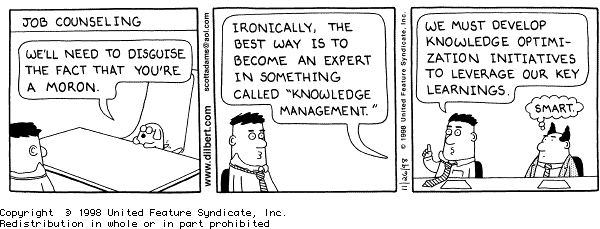Sunday, December 9, 2007
Taming the Monster II
I'm not going to offer my opinion on whether Citigroup should break up or not, but rather what I would do in each scenario.
If Citigroup were to break up, then the main task would be to ensure that the parts do not lose their organisational memory. This means making sure that staff with sufficient knowledge of how the unit operates vis-a-vis the entire group are retained. This is important because losing organisational memory might translate to loss of potential business opportunities or being blindsided by operational issues. For example, if the business unit has been insourcing or outsourcing certain functions from the group, it might make sense to consider growing or abandoning it (whichever scenario dictates).
If Citigroup were to remain intact, then the culture of all business units would need to be align to that of the group. This means looking at the strength of each business unit to see how it can contribute to the growth of the group. This can be carried out in the following ways:
1. Conduct a knowledge audit to inventorise the knowledge assets within the organisation
2. Map the knowledge assets to the business units (define the creators, users & owners)
3. Map the knowledge assets to the business processes of the units (this can actually lead to the discovery of synergies between the units)
Of the two options, the breakup is the easiest to carry out. The impact to the organisation will be minimal (if we are to believe what the pundits are saying about Citigroup being a collection of businesses). However, keeping the company intact is where the value proposition lies. But the alignment of culture, resources, IT systems, values, etc; will be a mammoth task that no CEO will look forward to. But if executed successfully, this can be a rewarding experience.
From this standpoint, I am for the idea of a financial hypermarket. But while that is the case, I need to add a caveat. The building of a financial hypermarket dream is what got Citigroup into this mess in the first place.
Perhaps the critics have been right all along.
Sunday, December 2, 2007
Knowledge Management: Art or Science?

Though I am in this field, I can understand perfectly why people have this notion of Knowledge Managers as snake oil salesman. One of my friends point out to me (and rightly, I might add) that KM is a discipline that tries to lay a claim on everything.
But try as I might, I do not see how KM can be be clearly delineated into specific practices. My thoughts on this? In my first post, I had endorsed my former lecturer's definition of KM. For me it's that simple - if it works, that's the type of KM that your organisation needs.
An article by my friend on the debate of whether management is an art of science gave me insights into how KM should be perceived. KM is a SKILL. Like all skills, it has to be cultivated. One does not become an expert overnight. Ian Thorpe had to overcome a chlorine allergy in order to swim in his first race, but he subsequently went on to win 5 Olympic gold medals.
That means organisations must not be afraid to dust themselves off & get up on their feet again if they stumble & fall while implementing their KM projects. If not, how will they ever learn or polish their KM skills?